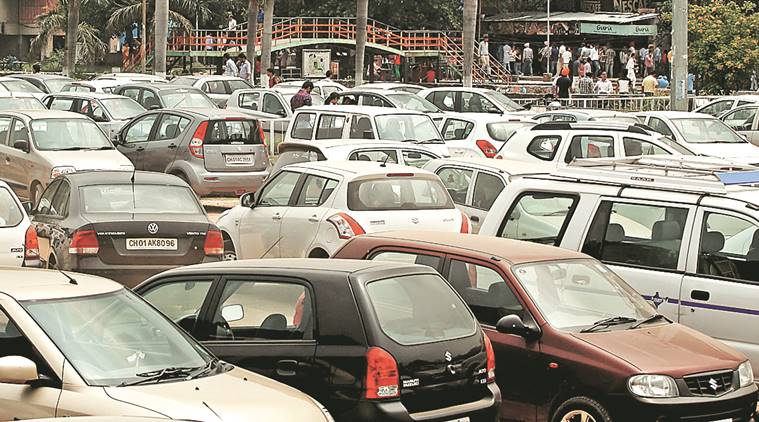- India
- International
Panjab University’s headache: Traffic clogged roads on campus
More than 5,000 four-wheelers pass through Panjab University’s campus on a daily basis
 Cars of visitors parked at Panjab University in Chandigarh. Express
Cars of visitors parked at Panjab University in Chandigarh. Express
“It is hard to put an exact number to it, but between 5,000 to 7,000 cars are seen entering and exiting Panjab University campus everyday,” says Ashwani Koul, Panjab University (PU) Chief Security Officer (CSO). Despite many changes suggested by the university’s student council, committees and administrative members, over the past few years, to decongest vehicular traffic at PU, no concrete step has been taken yet to reign the situation.
“Most public university campuses are completely enclosed and do not allow students to bring in their cars, nor do they allow thoroughfare. However, PU allows for both, which is neither environmentally friendly, nor logistically pliable anymore, since the campus remains chock-a-block too often,” says an official at the university.
According to the varsity rules, students residing on campus are not allowed to bring their cars. “Students are not allowed to register their cars at their hostel anymore,” says Neena Caplash, Dean Student Welfare for Women in hostel. However, despite the regulations, many students bring their cars and park them in one of the many official or makeshift parking lots on campus. “It is hard to enforce blanket resolutions such as banning of student vehicles because these decisions are always met with an uproar,” says CSO Koul.
President of the PU Students’ Council, Chetan Chowdhury says it is unfair to put the blame of road congestion on students, when thoroughfare is allowed on campus. “Many people from outside are allowed to pass through the campus to reach elsewhere, like PGI, which should not be allowed. The security at the gate should check who is passing through the campus, and we should restrict the movement of outsiders,” says Chowdhury.
Chowdhury also says that a proposal was made by the members of the students’ council in 2014, to install automated barricades along with smart cards or tags to allow entry of registered vehicles. “They could put a smart tag on the cars of students or anyone else who has any business on the campus, after taking permission, but that was never really implemented,” claims Chowdhury. However, CSO Koul says that similar barricades were put and a rule was implemented under former Vice-Chancellor RC Sobti, but the barricades were damaged by the students, resulting in loss of lakhs of rupees of the university.

During the 2015 campus student council elections, a referendum was held in the university to ascertain whether the student population favoured a blanket ban on vehicular traffic. According to members of the current council, the referendum was inconclusive, as there was almost equal number of students who agreed and students who disagreed with the imposition of a vehicular ban. “Furthermore, most of the student parties, except SFS, are against a total ban on student vehicles on campus,” says Chowdhury.
President of SFS party on campus, Varinder said that the results of the referendum were in favour of banning four-wheelers on campus. “We believe that an educational institute should not have four-wheelers on campus, and that is what the referendum also suggested. However, no concrete step was taken to implement that decision,” he says.
In an effort to regulate vehicular traffic and take steps towards eco-friendly commute, the university recently purchased 277 bicycles and installed them at each hostel. “The bicycles cost around Rs 12 lakh. They were sponsored by a company through their CSR wing,” says Registrar Karamjeet Singh. In an interview with Newsline, current VC Raj Kumar had also said that the university has been looking to buy more cycles.
“But buying more cycles is not sustainable, because they need to first add more cycle stands in the various departments. The idea was to allow hostellers to commute to their departments on the campus, but if there are no stands at the departments, how will it work?” asks student council Vice-President Rahul Kumar.
Apart from the lack of bicycle stands at departments, the campus also does not have a dedicated cycle path.
The need for controlling traffic at the university is not only necessary for decongesting the roads, but also to promote environment-friendly practices and control pollution caused by vehicles’ emissions. “For the upcoming NAAC visit, we need to ensure eco-friendly practices on campus and show that we have developed infrastructure which sustains it, so limiting vehicular traffic should be a part of that agenda,” says a university official.
Must Read
Apr 19: Latest News
- 01
- 02
- 03
- 04
- 05






































